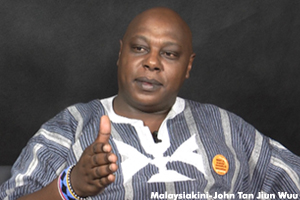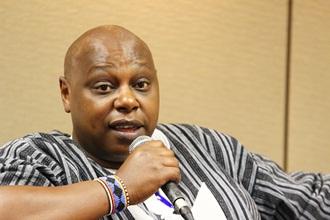There should be no restriction on how NGOs derive their funding, whether it is from local or foreign sources, said UN Special Rapporteur on the Rights to Freedom of Peaceful Assembly and of Association, Maina Kiai.
He told a public forum today that funding is vital in exercising the right to freedom of association, and the same standards for funding governments and corporations should apply to NGOs as well.
 “I know Malaysia received a lot of foreign funding in its early days and it should now be a provider of funding. Nobody ever accused the government of being a foreign agent.
“I know Malaysia received a lot of foreign funding in its early days and it should now be a provider of funding. Nobody ever accused the government of being a foreign agent.
“Similarly, the same goes with associations. You cannot exercise that right (to association) if there is no funding,” said the prominent lawyer from Kenya.
Kiai added that many businesses in Malaysia have access to foreign funding as well, and such is the reality of how the modern world works.
Although there is a need to hold NGOs accountable, he said this “should be done in a manner that is not meant to control civil society.”
He also said that it is not the international norm for freedom of association to be incumbent on registration of an organisation.
“If you want to meet as the Househusband’s Club of Kuala Lumpur, you are welcome to meet and do whatever you want to do as househusbands. You don’t need to get a licence or permits for that,” he said.
However, without elaborating further, he also said that it is a separate matter should bank regulations require an association to be formally registered before opening a bank account.
Probe into Suaram's finances
The UN special envoy was speaking on the international standards and practices in exercising the freedom of assembly and association during a forum at the Bar Council’s auditorium in Kuala Lumpur.
Kiai’s remarks were targeted at the recent investigation launched by the authorities into the sources of funding of human rights group and forum co-organiser Suaram, which include agencies from the United States and Germany.
During the forum, Kiai was also asked to comment on a member of audience’s observation that government and corporate employees are often reluctant to identify themselves out of fear of reprisal from their employers.
He replied that this should not be the case, as human rights are for every individual.
“Civil servants in Malaysia - if they want to protest - they can and they should. They should not be in trouble for it because they are entitled to their own views.
“When they are doing their jobs, they are doing their jobs in the civil service... that is a very separate thing, but you must have your personal life,” he said.
As for corporations, he said they should not victimise employees who were arrested for participating in protests because they were merely exercising their rights and it is different from being arrested for crimes such as theft or assault.
He suggested that lawyers, many of whom advise corporations on their legal affairs, should educate their clients of these fundamental rights.
Party hoppers should face fresh polls
When asked to comment on calls to force politicians to resign from public office should they switch party allegiance and whether it infringes on the freedom of association, Kiai said the party-hopper should seek fresh elections.
“If people are going to hop from one party to another, surely they would need to go back to the electors and seek a mandate.
“If you really don’t like the party you are elected in, the decent thing to do is to resign rather than to continue,” he said.
 He added that in most parliamentary democracies, political parties are almost as important as the individuals who become MPs, and party-hopping would only ‘work’ in systems where individuals are elected for who they are, rather than their party.
He added that in most parliamentary democracies, political parties are almost as important as the individuals who become MPs, and party-hopping would only ‘work’ in systems where individuals are elected for who they are, rather than their party.
However, he cautioned anti-hopping laws may not put the issue to rest. In Kenya where such legislation exists, he said parliamentarians simply do not formally resign from their party, but vote in favour of other parties’ initiatives.
He said this with the caveat that he was speaking as a Kenyan rather than a UN rapporteur, since he has not given the issue of party-hopping in context of freedom of association much thought.

